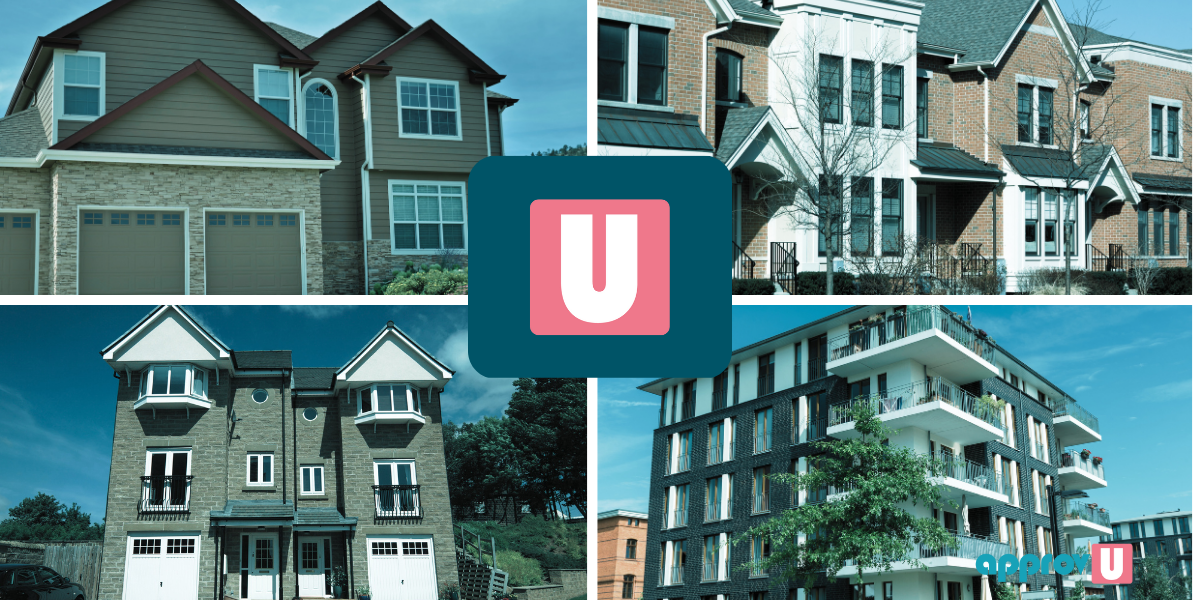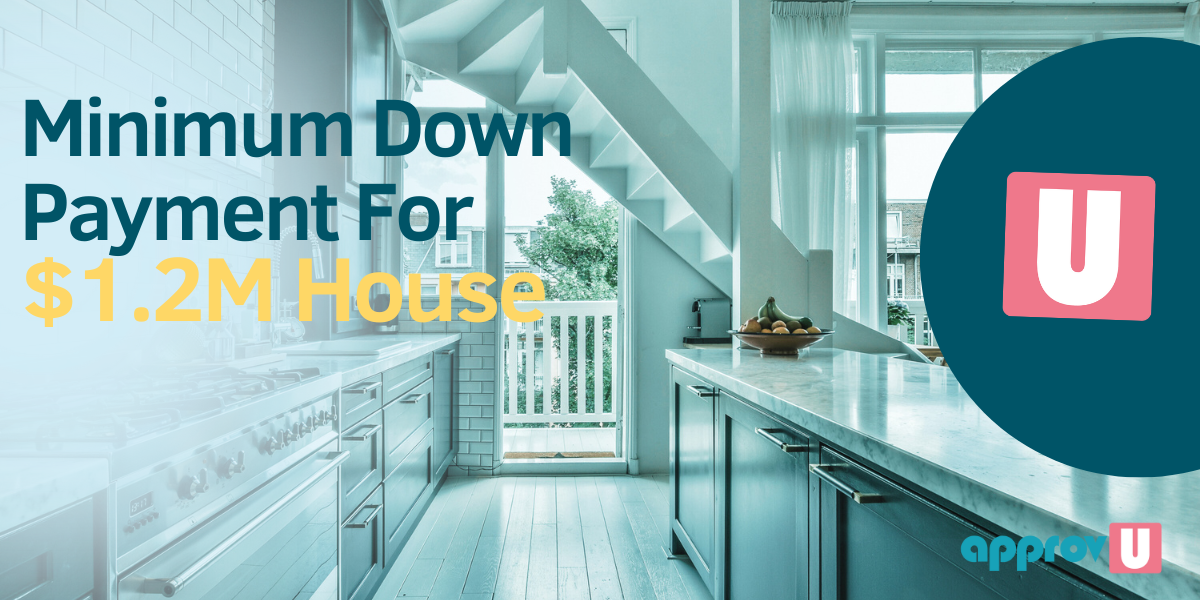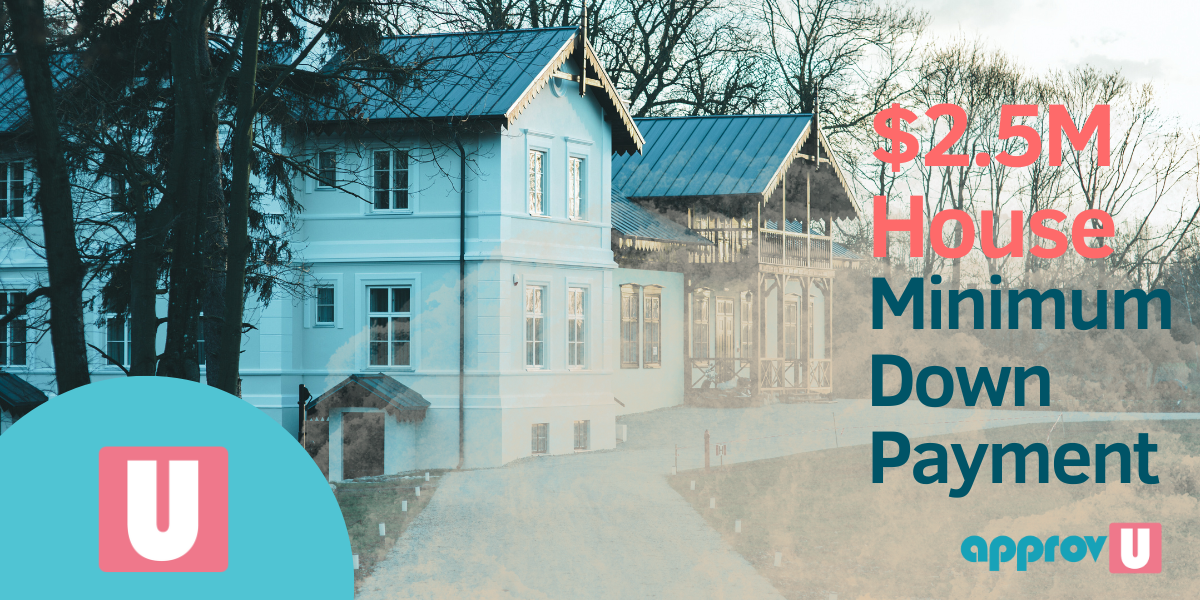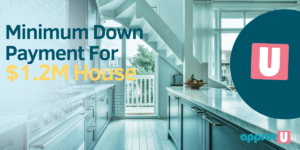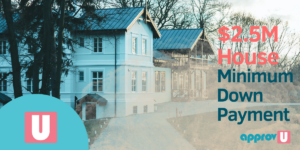Houses play a big role in our lives, don’t they?
They’re not just where we live but also a future investment. And in Canada, you’ve got a lot of options to choose from – from single-family homes to condos and townhouses.
Each type has unique features that could affect your lifestyle and financial situation.
And if you’re considering getting a loan to buy or build a house, knowing the best types of homes to finance with a mortgage is essential.
That’s why I’m here to provide information on the best houses in Canada for mortgage financing and help you determine which type of property might be the right fit for you.
Definition of Houses
Houses include many dwelling options, from apartments and condominiums to townhouses and single-family homes used for permanent residency.
Houses come in all shapes and sizes, so you can find one that fits your needs and preferences.
If you’re on a budget or living alone, a small apartment could be the way. But if you’ve got a family to think about, a big single-family home might be more up your alley.
And if you’re looking for something in between, townhouses and duplexes can offer a good balance of affordability and space.
Types of Houses in Canada for Mortgage Purposes
Regarding mortgages and buying a home, it’s important to understand the different types of houses available in Canada.
Why?
Because the type of house you choose can greatly impact the mortgage you’re eligible for and your monthly payments.
Each type of house, like single-family homes, townhouses, condos, and multi-family homes, has unique characteristics, pros, and cons that can affect your mortgage options, payments, and long-term investment prospects.
By understanding the different types of houses, you can make an informed decision and choose the one that’s right for you, your budget, and your lifestyle.
And it’s not just helpful when it comes to buying a home – knowing the types of houses can give you valuable insights into the real estate market, which will help you make smart investment decisions.
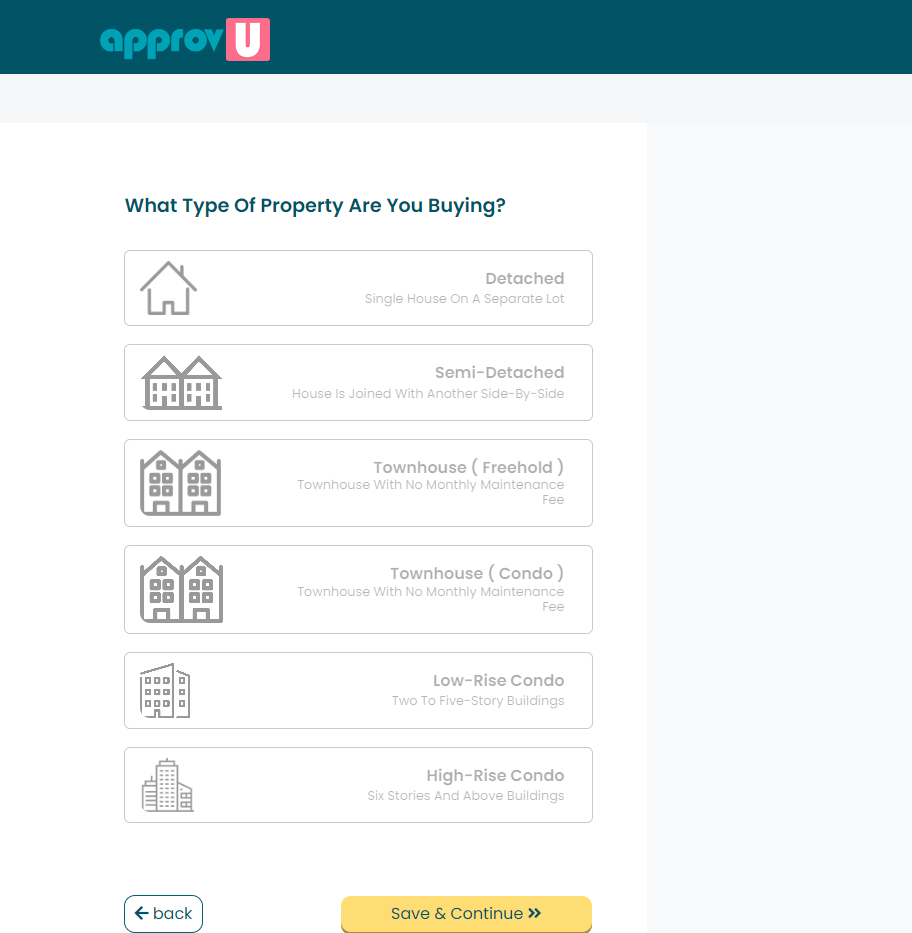
Single-Family Houses
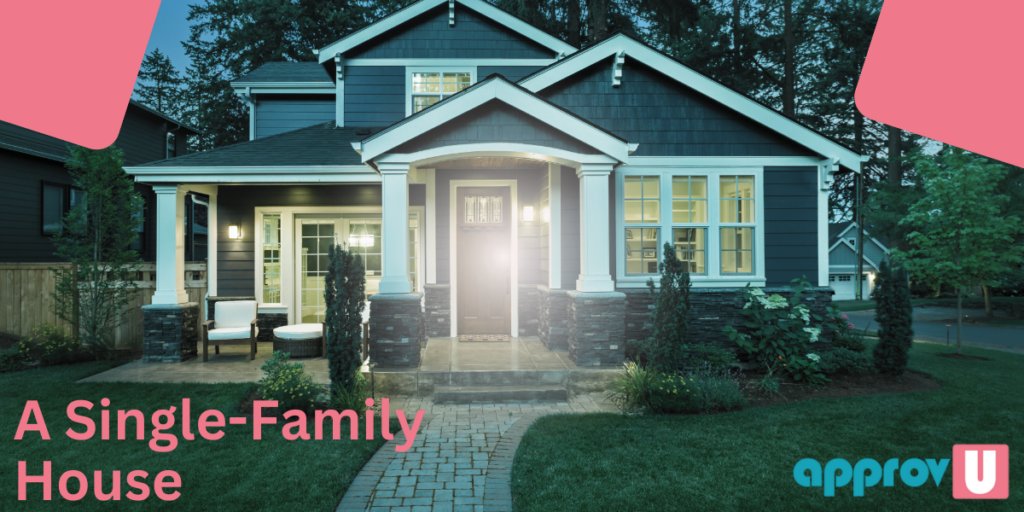
A Single-Family House in Canada for Mortgage Purposes
A single-family house is a housing unit designed to house only one household, typically a family.
This type of house is self-contained and does not share walls, floors, or ceilings with any other home. It is usually built on its lot and surrounded by a yard and outdoor space, providing privacy and a sense of seclusion.
Single-family homes are a popular type of housing in Canada and are most favoured for mortgages. They are valued for their spaciousness, privacy, and ability to personalize the living space to suit individual needs and preferences.
Characteristics of Single-Family Houses
- Structure: Single-family homes are standalone structures, which means they are not attached to other homes and have their own walls, roofs, and foundations.
- Size: They can vary, but typically they have enough space to accommodate a single household.
- Yard and outdoor space: Another key characteristic of single-family homes is the yard and outdoor space, which are private and separate from other homes. You can use the space for outdoor activities, gardening, and entertaining.
- Homeownership: Most often, single-family homes are purchased and occupied by the owner, which allows for more control and stability over the property. Living on a single property you own is a sense of pride.
Pros of Single-Family Houses
- Privacy: One big perk of a single-family house is privacy. You don’t have to worry about sharing walls or common spaces with your neighbours. So, if you’re looking for a little quiet, this type of house might be a good fit for you. You’ll have your own space to relax and unwind away from the hustle and bustle of communal living.
- Space: Single-family homes have more space than other house types. This extra space can give you more privacy, storage, and room to grow. Plus, your private yard and outdoor space are often separate from your neighbours. This can be great for gardening, recreation, and enjoying your private oasis.
- Customization: You can easily personalize a single-family home to make it yours! These homes are often built specifically for a family, so you can customize them to fit your unique style and needs. Make it a reflection of you and your family, whether with a cozy fireplace, a gourmet kitchen, or a backyard perfect for entertaining.
Cons of Single-Family Houses
- Maintenance: Single-family homes typically require more maintenance than other types of homes, as you are responsible for the upkeep of the entire property.
- High Purchase Cost: Single-family homes are often more expensive to purchase and maintain than other types of homes, which may only be feasible for some individuals or families.
- Isolation: Single-family homes can sometimes be isolated from neighbours and the community, disadvantaged individuals who value community and social interaction.
Multi-Family Houses
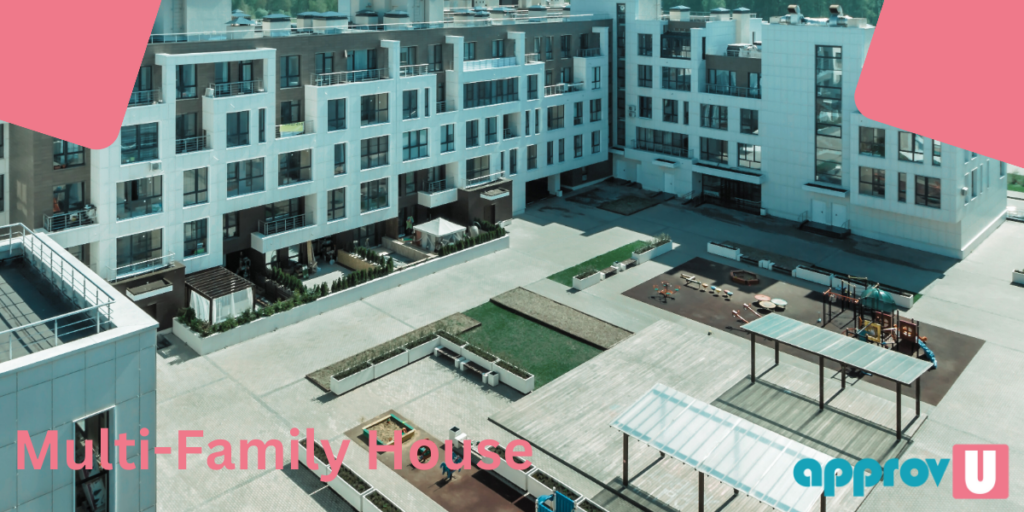
A Multi-Family House in Canada for Mortgage Purposes
A multi-family house is a residential building accommodating more than one household, typically with multiple units such as apartments or townhouses.
These units may be owned by a single person or entity, rented to multiple tenants, or individually owned as condominiums.
Multi-family houses are often found in urban areas and provide a convenient and affordable housing option for people who want to live close to the city centre.
Characteristics of Multi-Family Houses
- Amenities: It may offer shared amenities, such as a common area, pool, gym, or laundry facilities, for the convenience and enjoyment of residents.
- Parking: Multi-family homes may have limited or shared parking options for residents and guests, such as street parking or shared garages.
- Maintenance: Maintenance responsibilities may be shared among the residents, the property manager, or the Condominium Board, depending on the arrangement
Pros of Multi-Family Houses
- Investment Opportunity: Multi-family homes might be a good investment option and a great way to generate passive income. Since you’re renting out multiple units, they often have the potential to bring in more rental income than single-family homes.
- Economies of Scale: Operating and maintaining a multi-family property can be more cost-effective as the expenses are spread across multiple units.
- Community Living: Multi-family homes often have a tight-knit community feel, with the opportunity to interact and get to know your neighbours, which can be a big plus for some people.
Cons of Multi-Family Houses:
- Noise and Privacy: Multi-family homes can be prone to noise and privacy issues, as residents share walls, floors, and ceilings with neighbours.
- Maintenance Issues: Maintenance issues can be a hassle for tenants. You are responsible for handling repairs that can be inconvenient and disrupt my residents’ daily lives.
- Becoming a Landlord: When investing in a multi-family property, you must understand the responsibilities of being a landlord. This can include dealing with tenant issues and concerns, maintenance and repairs, and managing finances such as rent and bills. While being a landlord can be a lucrative investment, it also comes with challenges and headaches.
Townhouses
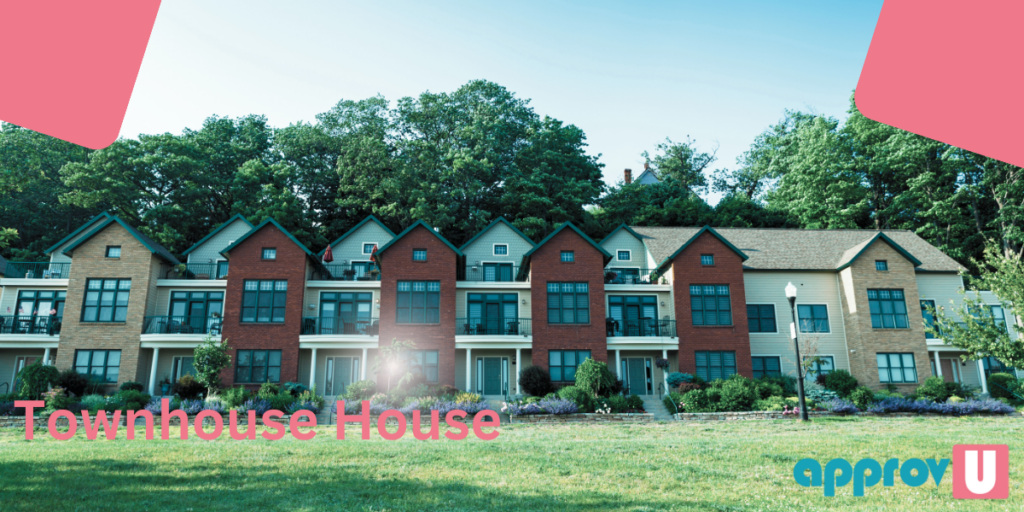
A Townhouse in Canada for Mortgage Purposes
A townhouse in Canada is an attached dwelling that shares at least one wall with another unit.
Townhouses are typically two or more stories tall and offer a combination of privacy and shared common spaces, such as a shared entrance or driveway.
They are often considered a compromise between single-family homes and apartment living.
Characteristics of Townhouses
- Multi-unit structure: Townhouses can be a row of homes with walls, so you’ll live in close quarters with your neighbours.
- Size and Amenities: Townhouses can come in different sizes, from cozy, compact places to bigger, multi-level homes. Plus, you can enjoy shared amenities like a pool, playground, or community center.
- Maintenance: You don’t have to worry about all the maintenance responsibilities in a townhouse community. Maintenance is all taken care of as a community! The homeowner’s management board will keep the place looking great by taking care of the landscaping and ensuring the outside is well-maintained.
Pros of Townhouses
- Affordable Option: Townhouses are cost-effective for homebuyers, especially those looking to buy their first home or downsize. They are often cheaper than single-family homes, making them a popular option for those on a budget.
- Low maintenance: They typically require less maintenance than single-family homes, as the homeowner’s association or community often cares for common areas and exterior spaces.
- Location: These are often found in densely populated areas, making them a convenient option for those close to amenities, public transportation, and urban centers.
- Amenities: Many townhouse communities offer amenities such as swimming pools, clubhouses, parks, and playgrounds available to residents.
- Larger Space: Townhouses often offer more living space than apartments, making them an attractive option for families and those looking for more room.
Cons of Townhouses
- Privacy Concerns: Living in a townhouse, you may have to compromise on privacy as these homes are attached to other homes and share walls. A townhouse may not be the best choice if you want a more private living situation.
- Noise: Living in a townhouse complex means you’re close to your neighbours, which can be great if you want to make new friends. However, if you have noisy neighbours, you might be disturbed by their sounds. This is especially true for those living in townhouses near busy streets.
- Maintenance Fees: Townhouses are often part of a homeowner’s association, which can result in monthly or annual fees for the maintenance and upkeep of common areas.
- Limited Customization: If you love personalizing your living space, consider this before choosing a townhouse. Townhouses often have restrictions on changes you can make to the outside of your home, so you may need to work within those limitations.
- Limited Outdoor Space: Townhouses typically have smaller yards or outdoor spaces than single-family homes, which can be a drawback for those who desire a larger outdoor area.
Condos
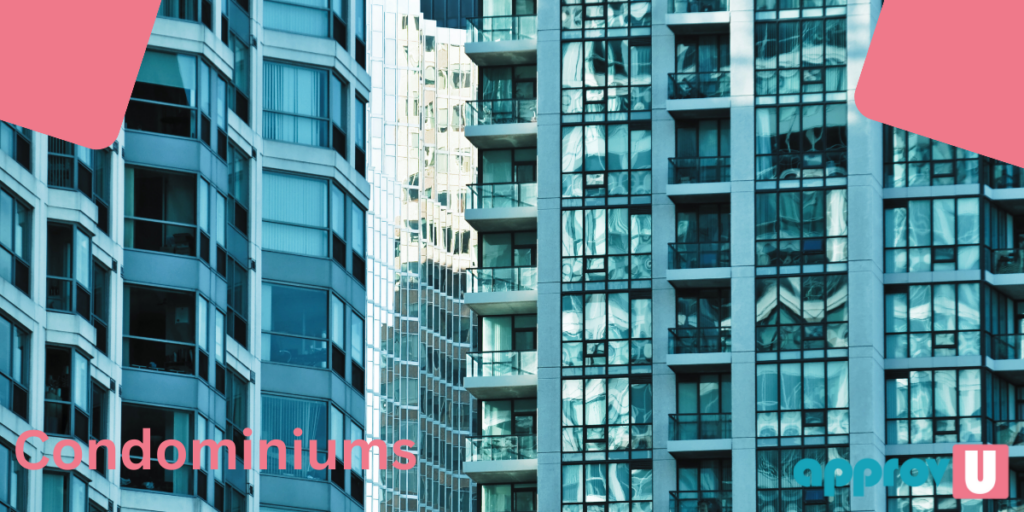
A Condo in Canada for Mortgage Purposes
A condo, short for condominium, is a housing unit similar to an apartment but privately owned instead of rented.
A condo typically refers to a unit in a multi-unit building or complex.
The owner holds title to their specific unit and shares ownership of common areas such as hallways, elevators, and amenities like swimming pools or fitness centres with other unit owners.
The unit owner is responsible for its maintenance and upkeep, while the common areas are managed by a homeowner’s association or management company.
Characteristics of Condos
- Condominium Maintenance: The management board typically handles the maintenance of common areas, exteriors, and amenities. You’ll have to pay a monthly or annual fee to cover the costs of shared spaces and amenities. So, remember that you’ll need to pay this fee in addition to your monthly mortgage payment.
- Space: If you’re looking for a variety of size options, condos might be the way to go. They come in different shapes and sizes, from compact studios to roomy three-bedrooms.
- Parking: You won’t have to worry about finding a spot on the street while living in a condo. Most of them come with a designated parking spot, whether it’s in an underground garage or parking lot.
- Community Feel: Living in a condo can be a great way to build community since you’ll share spaces with your neighbours.
- Investment Opportunity: If you’re looking for a good investment, condos are known to increase in value and can provide a steady stream of rental income.
Pros of Condos
- Low Maintenance: With condos, you don’t have to stress about yard work or exterior maintenance – all taken care of by the Condominium Management Board. You can sit back, relax, and enjoy your low-maintenance living.
- Security: Condos often have added security measures like gates around the community, intercoms for guests, and even on-site security staff to make residents feel extra safe.
- Convenient Location: Many condos are located in bustling areas close to all the action, such as shopping, dining, and entertainment. It’s an easy and convenient lifestyle in a prime spot.
- Shared Amenities: If you love socializing and making new friends, you’ll love living in a condo! Condos often have shared amenities like a swimming pool, gym, and other fun recreational facilities. So, you can enjoy all the perks of community living and meet new people while staying active and healthy.
- Budget-Friendly Option: Condos can be a great choice if you want to save money on housing. They’re often more affordable than single-family homes, especially in pricey city locations.
Cons of Condos
- Limited Space: Condos are typically smaller than single-family homes, which can be limiting for families or those who need extra space.
- Rules and Regulations: Living in a condo means abiding by the rules and regulations set by the homeowners association, which can be restrictive for some individuals.
- Noise: Living close to neighbours can increase noise levels, which can be challenging for some people.
- Lack of Privacy: Condos are attached units with shared walls, which can reduce privacy compared to standalone homes.
- Maintenance Fees: Living in a condo means paying monthly or yearly maintenance fees to cover the cost of shared amenities and common area maintenance, which can be a significant expense for some people.
Conclusion of the 4 House Types in Canada
When it comes to housing in Canada, you’ve got a lot of options to choose from.
Each housing type has pros and cons, so it’s important to consider what matters most to you – cost, maintenance, privacy, and location.
Whether you’re after a single-family house, multi-family house, townhouse, or condo, there’s bound to be a place that fits your needs.
And if you’re looking to invest in real estate or buy a home, it’s really helpful to understand the different types of houses.
This way, you can make the best budget and lifestyle decisions.
Plus, you’ll have a better understanding of the real estate market, which will help you make smart decisions when it comes to property.


